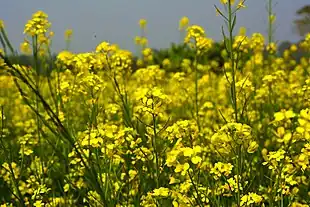خردل
Arabic

خَرْدَل
Etymology
Uncertain, previous comparisons to an Akkadian source have been depreciated as uninformed readings; compare Hebrew חַרְדָּל (ḥardal), Jewish Palestinian Aramaic חרדלא (ḥardlā), Jewish Babylonian Aramaic חַרְדְּלָא (ḥardlā), Classical Syriac ܚܪܕܠܐ (ḥardlā), and potentially Akkadian 𒄷𒊏𒁺 (/ḫurādu/, “unidentified aromatic plant possibly in reference to mustard seeds; aromatic seed or spice mix”, literally “pebbles, little stones”); perhaps connected ultimately to Proto-Semitic *ḥaraθ- (“to sow, to plant seeds, to till, to plow, to cultivate”) or Sumerian 𒌑𒄯𒄯 (/ḫarḫar/, “unidentified plant yielding seeds used as a spice”) of uncertain provenance.
Pronunciation
- IPA(key): /xar.dal/
Noun
خَرْدَل • (ḵardal) m (collective, singulative خَرْدَلَة f (ḵardala))
- mustard (plant and condiment)
Declension
Declension of noun خَرْدَل (ḵardal)
| Collective | basic collective triptote | ||
|---|---|---|---|
| Indefinite | Definite | Construct | |
| Informal | خَرْدَل ḵardal |
الْخَرْدَل al-ḵardal |
خَرْدَل ḵardal |
| Nominative | خَرْدَلٌ ḵardalun |
الْخَرْدَلُ al-ḵardalu |
خَرْدَلُ ḵardalu |
| Accusative | خَرْدَلًا ḵardalan |
الْخَرْدَلَ al-ḵardala |
خَرْدَلَ ḵardala |
| Genitive | خَرْدَلٍ ḵardalin |
الْخَرْدَلِ al-ḵardali |
خَرْدَلِ ḵardali |
| Singulative | singulative triptote in ـَة (-a) | ||
| Indefinite | Definite | Construct | |
| Informal | خَرْدَلَة ḵardala |
الْخَرْدَلَة al-ḵardala |
خَرْدَلَة ḵardalat |
| Nominative | خَرْدَلَةٌ ḵardalatun |
الْخَرْدَلَةُ al-ḵardalatu |
خَرْدَلَةُ ḵardalatu |
| Accusative | خَرْدَلَةً ḵardalatan |
الْخَرْدَلَةَ al-ḵardalata |
خَرْدَلَةَ ḵardalata |
| Genitive | خَرْدَلَةٍ ḵardalatin |
الْخَرْدَلَةِ al-ḵardalati |
خَرْدَلَةِ ḵardalati |
| Dual | Indefinite | Definite | Construct |
| Informal | خَرْدَلَتَيْن ḵardalatayn |
الْخَرْدَلَتَيْن al-ḵardalatayn |
خَرْدَلَتَيْ ḵardalatay |
| Nominative | خَرْدَلَتَانِ ḵardalatāni |
الْخَرْدَلَتَانِ al-ḵardalatāni |
خَرْدَلَتَا ḵardalatā |
| Accusative | خَرْدَلَتَيْنِ ḵardalatayni |
الْخَرْدَلَتَيْنِ al-ḵardalatayni |
خَرْدَلَتَيْ ḵardalatay |
| Genitive | خَرْدَلَتَيْنِ ḵardalatayni |
الْخَرْدَلَتَيْنِ al-ḵardalatayni |
خَرْدَلَتَيْ ḵardalatay |
| Paucal (3-10) | sound feminine paucal | ||
| Indefinite | Definite | Construct | |
| Informal | خَرْدَلَات ḵardalāt |
الْخَرْدَلَات al-ḵardalāt |
خَرْدَلَات ḵardalāt |
| Nominative | خَرْدَلَاتٌ ḵardalātun |
الْخَرْدَلَاتُ al-ḵardalātu |
خَرْدَلَاتُ ḵardalātu |
| Accusative | خَرْدَلَاتٍ ḵardalātin |
الْخَرْدَلَاتِ al-ḵardalāti |
خَرْدَلَاتِ ḵardalāti |
| Genitive | خَرْدَلَاتٍ ḵardalātin |
الْخَرْدَلَاتِ al-ḵardalāti |
خَرْدَلَاتِ ḵardalāti |
Descendants
References
- Levey, Martin (1973) Early Arabic Pharmacology. An Introduction Based on Ancient and Medieval Sources, Leiden: Brill, page 60
Persian
Pronunciation
- (Classical Persian): IPA(key): /xaɾdal/
- (Dari): IPA(key): /xaɾdal/
- (Iranian Persian): IPA(key): /xæɾdæl/
- (Tajik): IPA(key): /xaɾdal/
Descendants
- → Hindustani:
- Hindi: ख़र्दल (xardal)
- Urdu: خردل (xardal)
Urdu
This article is issued from Wiktionary. The text is licensed under Creative Commons - Attribution - Sharealike. Additional terms may apply for the media files.